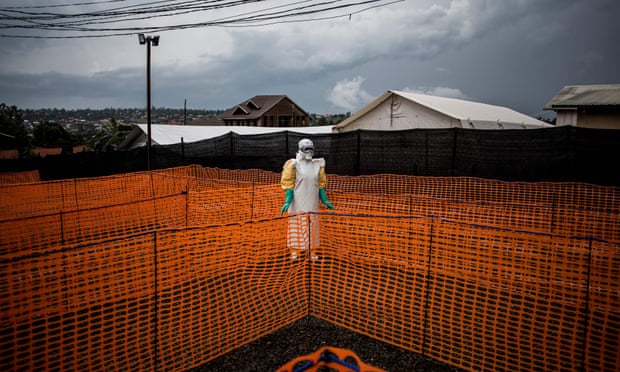Health authorities in the Democratic Republic of Congo are racing to contain a possible Ebola outbreak, after a woman died from the virus near the eastern city of Butembo.
The woman showed symptoms on 1 February in the town of Biena, North Kivu. She died in hospital in Butembo two days later. She was married to a man who had contracted the virus in a previous outbreak.
“It was a farmer, the wife of a survivor of Ebola, who showed typical signs of the disease on February 1,” health minister Eteni Longondo told state television RTNC.
The virus can live in the semen of male survivors for more than three years, according to a study in the New England Journal of Medicine.
“The provincial response team is already hard at work. It will be supported by the national response team which will visit Butembo shortly,” the health ministry statement said.
The announcement potentially marks the start of Congo’s twelfth Ebola outbreak since the virus was discovered near the Ebola River in 1976, more than double any other country.
The symptoms are severe: high fever and muscle pain followed by vomiting and diarrhoea, skin eruptions, kidney and liver failure, internal and external bleeding.
It comes three months after Congo announced the end to its eleventh outbreak, hundreds of miles away in the west, which infected 130 people and killed 55.
The widespread use of Ebola vaccinations, which were administered to more than 40,000 people, helped curb the disease.
That outbreak in the west of the country overlapped with an earlier one in the east that began in 2018 and finished in June. It killed more than 2,200 people, the second-most in the disease’s history. It was worsened by unprecedented challenges, including entrenched conflict between armed groups, the world’s largest measles epidemic, and the spread of Covid.
The emergence of more cases could complicate efforts to eradicate Covid-19, which has infected 23,600 people and killed 681 in Democratic Republic of Congo. A vaccination campaign is expected to start in the first half of this year.
“While there is hope that this early identification of an infection may help with quickly containing this outbreak, back-to-back Ebola outbreaks and Covid-19 has stretched Congo’s health systems to the limit and this could put far greater strain on an already exasperated system,” said Jason Kindrachuk, an assistant professor at the department of medical microbiology and infectious diseases at Canada’s University of Manitoba, and who is conducting research on survivors from the 2014-2016 West Africa Ebola outbreak, the deadliest ever
Congo’s equatorial forests are a natural reservoir for the Ebola virus, which causes severe vomiting and diarrhoea and is spread through contact with body fluids such as blood, vomit and semen.
In a statement on Sunday, the World Health Organization said it wasn’t unusual for sporadic cases to occur following a major outbreak and that previous Ebola responses were already making it easier to deal with this one.
“The expertise and capacity of local health teams has been critical in detecting this new Ebola case and paving the way for a timely response,” said Dr Matshidiso Moeti, WHO regional director for Africa. The WHO is investigating the case and trying to identify the strain of the virus to determine its link to the previous outbreak.
Congo has suffered more than a quarter-century of conflict and distrust of government health workers and other outsiders is high in eastern Congo. Residents in Butembo are already asking why it took four days from the time the woman was tested to announce the results.
“It’s frustrating because the contacts will have moved and it will be difficult to find them,” Vianey Kasondoli, a Butembo resident, said.
“The government and the ministry of health have to contain the disease as soon as possible.”
The average fatality rate from Ebola is around 50% but this can rise to 90% for some epidemics, according to the World Health Organization.
The virus that causes Ebola is believed to reside in bats.
The Guardian
More about: ebola
















































